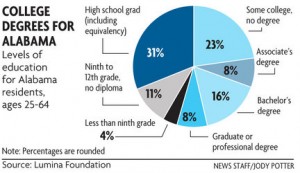September 23rd, 2010
A report on al.com Tuesday, “Alabamians lag on college degrees,” summarized the findings from a recent Lumina Foundation study, A Stronger Nation Through Higher Education (PDF).
Namely, we rank below the national average in higher educational attainment. 68.4 percent of working-age Alabama adults have no college degree. 8 percent have a 2-year associate’s degree, while 24 percent have a bachelor’s degree or higher.
This means that we’re less competitive with neighboring states for economic development, and our workers are less equipped for the future job market. According to a recent study by the Center for Education and the Workforce, Help Wanted: Projections on Jobs and Education Requirements Through 2018:
- by 2018, nearly two-thirds of jobs will require some form of higher education
- over the next 10 years, new jobs in Alabama requiring post-secondary education will increase by an estimated 132,000, while other jobs will increase by only 89,000
- currently, 55 percent of all jobs in Alabama require some form of post-secondary training
As we have said before, low educational attainment hampers our ability to attract economic development. We also know that college graduates bring over $1 million in spending power (PDF)back to their home communities.
A college degree is one of the fastest routes for an individual to move out of poverty into the middle class – and a strong, stable middle class benefits us all.
What is the good news?
- Our Higher Education Alliance and other K-12 and college programs are using innovative programming to educate our children and increase access to higher education. We talked about some of these initiatives at our recent Lifetime of Learning Conference.
- Our state gubernatorial candidates are publicly debating the role of the state in college access and funding for higher education, which means that people are starting to pay attention.
What can you do? Stay informed. Stay engaged. Help create a college-positive culture in your community (see page 12 of our annual report). And advocate for increased access to higher education through financial aid, mentoring programs, and improved college preparation.
Posted by Robyn Hyden
